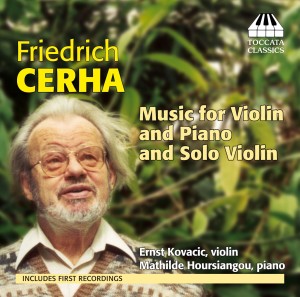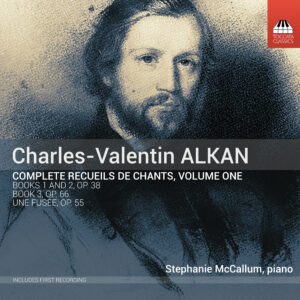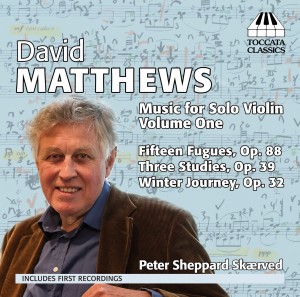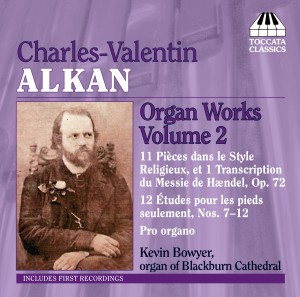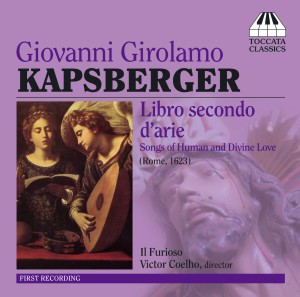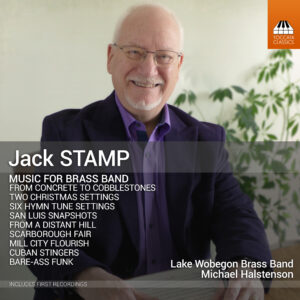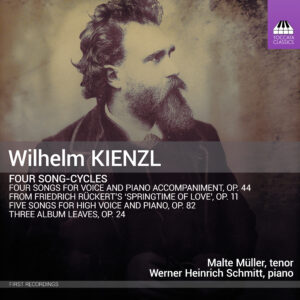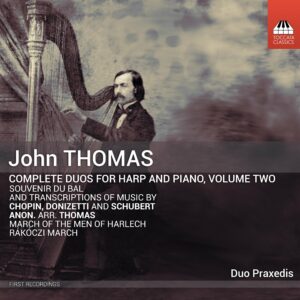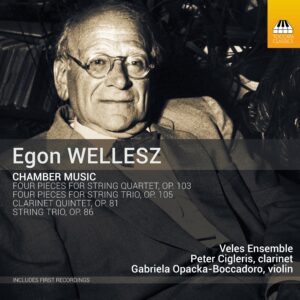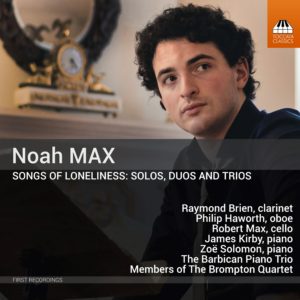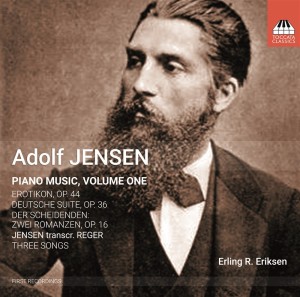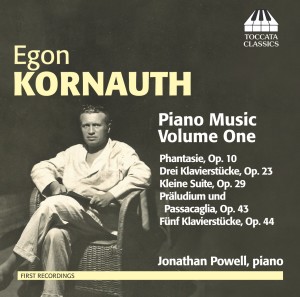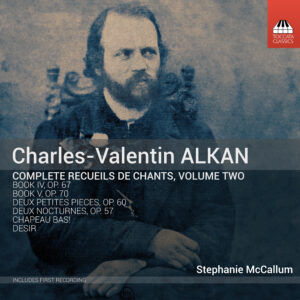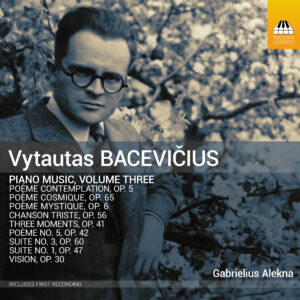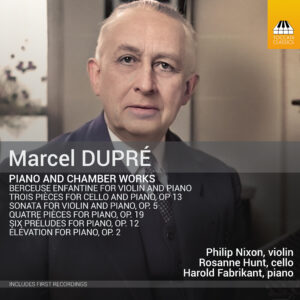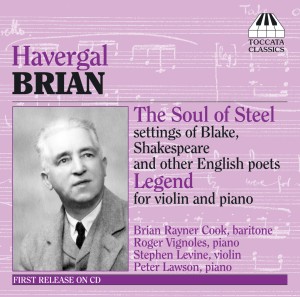Search Results for "The Black Alley Newty Ping" – Page 11
Showing results for black alley net ping
Friedrich Cerha: Music for Violin and Piano and Solo Violin
Friedrich Cerha, born in Vienna in 1926, is the doyen of Austrian composers, with a huge catalogue of music to his name. Cerha also trained as a violinist and most of the works in this anthology of his violin pieces were written for himself to play in the 1940s and '50s, when he was still active as a performer. It begins with his first surviving composition, the Hindemith-like First Violin Sonata of 1947; Stravinsky was another early influence before Cerha found the voice that made him Austria's leading avant-garde composer. Two later works, from almost half a century on, complete the stylistic trajectory.
Ernst Kovacic, violin
Mathilde Hoursiangou, piano
Charles-Valentin Alkan: Complete Recueils de Chants, Volume One
The wild originality of Charles-Valentin Alkan was little appreciated during his lifetime (1813-88), nor during the century which followed, when he was largely lost from sight. But now Alkan is increasingly recognised as one of the most individual personalities in all music. The five albums he called Recueils de chants — miniature tone-poems which marry Classical constraint to virtuoso Romantic excess — provide an attractive gateway to his freewheeling imagination.
Stephanie McCallum, piano
David Matthews: Music for Solo Violin, Volume One
David Matthews' Fifteen Fugues for solo violin, composed over four years between 1998 and 2002, not only constitute what is probably the largest set of violin fugues by a living composer; they also form an extended essay in musical portraiture, with each fugue 'depicting' its dedicatee. Like the Three Studies (1985) and Winter Journey (1982-83), a tone-poem for solo violin inspired by Schubert's Winterreise, they pose extraordinary technical challenges to the performer.
Peter Sheppard Skærved, violin
Charles-Valentin Alkan: Organ Works, Volume Two
In the last three decades the staggeringly original piano music of Charles-Valentin Alkan (1813-88) has emerged from the darkness that surrounded it over the previous century and today features regularly in recital programmes. But Alkan’s music for organ – much of it initially conceived for the now obsolete pedal-piano – is no less powerful and imaginative, although little of it had been recorded before Kevin Bowyer began this survey. His first recording of this repertoire drew ecstatic reviews from the critics; this second instalment (of three) offers music and playing of equal quality.
Kevin Bowyer, organ
Giovanni Girolamo Kapsberger: Libro secondo d’arie — Songs of Human and Divine Love
Giovanni Girolamo Kapsberger (1580–1651) was one of the most innovative and original composers in early seventeenth-century Rome, and a virtuoso on the lute and chitarrone, or theorbo. His Second Book of Arias, published in Rome in 1623, for one and two voices, are extraordinary works that reveal both his vivid imagination in setting poetry to music, and his flair for dramatic gestures, making him one of the most quintessentially 'Baroque’ composers of his time.
Il-Furioso
Victor Coelho, director
Jack Stamp: Music for Brass Band
Born in Maryland in 1954, John Stamp – universally known as ‘Jack’ – is a well-known figure, both as conductor and composer, in the symphonic wind-band movement that flourishes in US universities. But the sound of the brass band familiar in the UK has long been an enthusiasm, and his involvement with brass bands on both sides of the Atlantic – particularly the Minneapolis-based Lake Wobegon Brass Band, which takes its name from Garrison Keillor’s fictional Minnesota town – has generated a number of works which bring elements of the British brass tradition to audiences in the US Mid-West, imbuing them with a catchy rhythmic swing.
Steve Ecklund, horn
Bill Chouinard, organ
Lake Wobegon Brass Band
Michael Halstenson, conductor
Wilhelm Kienzl: Four Song-Cycles
The Austrian composer Wilhelm Kienzl (1857–1941) – also a pianist, conductor, musicologist and writer on music – enjoyed the esteem of his contemporaries particularly for his vocal music. But his star has waned over the past century, and only a handful of his 238 songs have had recent recordings. In style they range from the simple and folk-like to the dramatic and quasi-operatic; their harmonic world likewise embraces both the diatonic and chromatic, with hints of the influence of Schubert, Schumann, Brahms, Wagner and a foretaste of later composers. The four song-cycles recorded here treat the grand themes of life: love, loss, death and man’s interaction with nature.
Malte Müller, tenor
Werner Heinrich Schmitt, piano
John Thomas: Complete Duos for Harp and Piano, Volume Two
Harpist to Queen Victoria, the Welsh composer John Thomas (1826–1913) wrote prolifically for his own instrument, both for solo harp and for duos of two harps or harp and piano – a combination where the different sounds of the two instruments enhance the clarity of the texture. Thomas’ own compositions use the elegant Romantic style of his own day, but he also left a generous legacy of transcriptions, with no fewer than fourteen Schubert songs recorded on this second volume of his complete duos for harp and piano. Although some of his music was intended for the Victorian drawing room, other pieces require a virtuoso technique – and all of it has a thoroughly engaging melodic appeal.
Duo Praxedis
Praxedis Hug-Rütti, harp
Praxedis Geneviève Hug, piano
Egon Wellesz: Chamber Music
In its mix of tonality, Expressionism and Schoenbergian serialism, the late chamber music of Egon Wellesz (1885–1974) – born in Vienna but an Oxford don for almost four decades – marries the mid-century radicalism of his native city with the lyricism of his adoptive homeland. In the first part of his career Wellesz was best known as a composer of operas, and these chamber works were audibly written by someone with a keen sense of drama: in their primal passion, flawless pacing, arching melodic lines and occasional bursts of humour, one can almost imagine them on stage.
Veles Ensemble
Hartmut Richter, violin
Ralitsa Naydenova, viola
Evva Mizerska, cello
Gabriela Opacka-Boccadoro, violin (Tracks 9-15)
Peter Cigleris, clarinet (Tracks 13-15)
Noah Max: Songs of Loneliness: Solos, Duos and Trios
Noah Max – born into a musical family in London in 1998 – has already carved out an impressive career as a composer and conductor; he is also an accomplished painter and a poet. For someone so young, the surprise of this debut album is the sense of loss unifying these pieces. The feeling of innocence forgone is characteristic of the music of many English composers in the first half of the twentieth century, Elgar, Finzi, Howells and Vaughan Williams among them. Max’s music is clearly of its own time, but it shares the elegiac lyricism of those earlier masters.
Raymond Brien, clarinet (track 5)
Philip Haworth, oboe (tracks 16-18)
Zoë Solomon, piano (tracks 1-4, 6-8)
Members of the Brompton Quartet (tracks 9-14)
Maja Horvat, violin
Kinga Wojdalska, viola
Wallis Power, cello
The Barbican Piano Trio (track 19)
Sophie Lockett, violin (track 19)
Robert Max, cello (tracks 1-4)
James Kirby, piano (track 15)
Adolf Jensen: Piano Music, Volume One
Adolf Jensen (1837–79) is one of the major figures of German Romanticism, the composer of a large corpus of songs and piano music. Jensen’s musical language fuses the heritage of Schumann, Chopin and Liszt into an individual style distinguished by its melodic and lyrical appeal, and yet he has been almost entirely forgotten. This first in a series of recordings of his music hopes to restore his name to circulation.
Erling R. Eriksen, piano
Egon Kornauth: Piano Music, Volume One
The music of the Czech-born Viennese composer Egon Kornauth (1891-1959) was once a staple of Austrian concert-halls, though it has largely been forgotten in the half-century since his death. In this pioneering recording Jonathan Powell uncovers the many strands that fed into Kornauth's rich and full-blooded soundworld — dark, late-Romantic harmony, inventive counterpoint, rhythmic assiduity, a fondness for folk-music and, not least, a straightforward melodic charm.
Jonathan Powell, piano
Charles-Valentin Alkan: Complete Recueils de Chants, Volume Two
The wild originality of Charles-Valentin Alkan was little appreciated during his lifetime (1813-88), nor during the century which followed, when he was largely lost from sight. But now Alkan is increasingly recognised as one of the most individual personalities in all music. The five albums he called Recueils de chants — miniature tone-poems which marry Classical constraint to virtuoso Romantic excess — provide an attractive gateway to his freewheeling imagination.
Stephanie McCallum, piano
Vytautas Bacevičius: Piano Music, Volume Three
The Lithuanian pianist and composer Vytautas Bacevičius (1905–70) – exiled to the New World by the outbreak of the Second World War – is one of the undiscovered pioneers of the twentieth century. This third volume of his piano music presents works written between 1926 and 1959 and shows the evolution of his musical language from the post-Skryabin style of the early works, via the influence of Debussy, Prokofiev and Stravinsky, to a highly individual modernism that can occasionally nod to the jazz of his adoptive New York. It is a testament to the strength of Bacevičius’ personality that his musical identity remains consistent even as his manner evolves – his individuality is never in doubt, not least because of his enduring fondness for a playful gesture.
Gabrielius Alekna, piano
Marcel Dupré: Piano and Chamber Works
Marcel Dupré (1886–1971) was the most prominent French organist of his generation, playing hundreds of recitals on his international tours, and his compositions have entered the standard organ repertoire. But his piano and chamber works have not received the same attention. They are audibly French – there are points of contact with Chabrier, Fauré and Satie – but they go their own surprising way, occasionally taking on a ritual, even hypnotic, character that imparts an oriental, quasi-minimalist, flavour.
Philip Nixon, violin
Rosanne Hunt, cello
Harold Fabrikant, piano
Havergal Brian: Songs for baritone and piano, Legend for violin and piano
Havergal Brian (1876–1972) is renowned as the composer of 32 powerful symphonies (then the largest symphonic cycle since Haydn), 21 of them composed after his 80th birthday; his First Symphony, The Gothic, is reputed to be the largest ever composed. But in the first part of his career Brian was also active on a smaller scale, his songs attracting the advocacy of singers as prominent as John McCormack and John Coates. The range of emotion in these songs is nonetheless vast, from folky innocence via Shakespearean irony to deep tragedy. Brian Rayner Cook’s performances can be taken as authoritative: he studied the songs with the composer. The CD is completed by the Legend for violin and piano, Brian’s only surviving piece of chamber music.
Brian Rayner Cook, baritone
Roger Vignoles, piano
Stephen Levine, violin
Peter Lawson, piano
Stay In the Know
JOIN THE TOCCATA NEWSLETTER
"*" indicates required fields
By visiting our site, you agree to our privacy policy regarding cookies, tracking statistics, etc.
